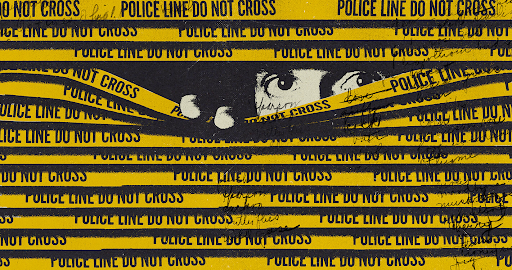Is Our Society’s Obsession with True Crime Unhealthy?
While many people indulge in true crime media as just another hobby, it has unforeseen consequences.

True crime entertainment hurts the victims and society.
May 23, 2023
Over the past few decades, the popularity of true crime has been ramping up. Podcasts, documentaries, TV shows, and movies have introduced the genre to millions of people. However, while it may seem like a harmless guilty pleasure, the consumption of true crime has real life consequences for the people involved, such as the family of victims, or even the victims themselves.
A huge issue with true crime media is the insensitivity. Influencers will discuss real life crimes like it’s gossip while doing their makeup, or explain the hardest times of people’s lives in a thirty second TikTok series. Victims and anyone close to them face serious repercussions. Instead of being given support, or even just left alone to grieve, their trauma is tossed around the true crime community like the juiciest new drama.
Unfortunately, insensitivity from every-day people isn’t the worst thing that victims and their loved ones must face. Large television companies such as Netflix or Hulu can and have made documentaries, movies, and TV shows about true crime events without consent or consultation from family members of the victim. Rolling Stone addresses this issue, referencing the film “Dead Asleep.” The victim’s sister, Jordan Preston, states “Hulu just released a documentary on how my little sister was brutally murdered without our families’ consent so now we get to relive the worst day of our lives.” Rolling Stone goes on to say that documentarians and journalists do not require consent from subjects if they’re planning to release stories about them, but it’s still best to reach out. Situations like this have devastating consequences for the victim’s family, who are faced with the worst part of their lives once again.
Desensitization is another issue in the true crime community. The Outspoken states “Uniquely, studies have shown that desensitization can lead to increased violence in individuals. Of course, that doesn’t mean that listening to true crime podcasts will make you as violent as those it discusses.” The issue with desensitization is not that it’s going to turn true crime consumers into actual criminals, but rather that it’s going to desensitize us as a society to death so much that it no longer affects us. An example of this could be a true crime fan no longer viewing people like murderers as dangerous or morally wrong, because they’re so desensitized that violent content just doesn’t affect them anymore.
The Ringer mentions that true crime often diminishes victims while lionizing the perpetrators of the crimes. This is another huge issue with many pieces of true crime media. Focus is put on the person responsible for the crimes, while fans who are simultaneously fascinated and revolted by said person end up putting a spotlight on them instead of focusing on the victims and how the crimes affected their lives and the lives of those they loved.
While true crime can be an interesting thing to indulge in, viewers should always be aware of where they are getting their information and who they are supporting by consuming true crime media.








